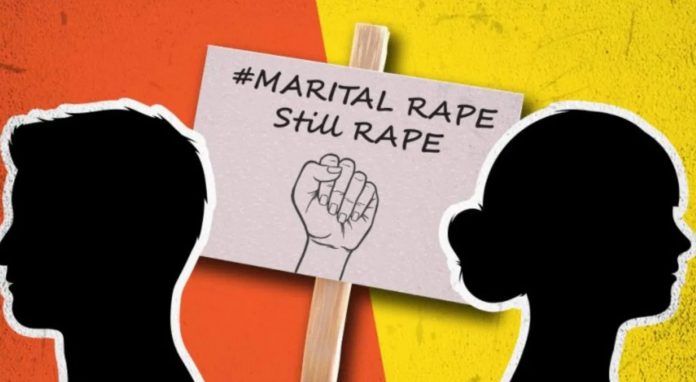This article is written by Himanshu Mahamuni, a student of Government Law College, Mumbai. This article analyzes the concern of Marital rape on a minor wife in India and legal provisions with the help of case law analysis.
Table of Contents
Introduction
India is one of the countries that treat women as a goddess but also has the largest rate of child marriages. The Prohibition of Child Marriage Act, 2006 (PCMA) prohibits and punishes the child marriage of girls below 18 years of age. The Act, however, legitimises a child born out of child marriage but remains silent on forceful sexual acts due to such marriage. This recognises the sexual relation within child marriage and does not address the issue of marital rape.
Marital rape is non-consensual sexual intercourse by force or physical violence by a man on his wife. Marital rape on minors can be considered even more heinous rape because the minor does not have the mental capacity to understand the crime. Unfortunately, India’s law does not recognize marital rape as an offence completely. India is one of the 36 countries where marital rape is not considered illegal. There existed Exception provisions in the Indian Penal Code (IPC) to protect the husband from the charges of rape on the minor wife before it was annulled by the courts. The institution of marriage supports child marriage because of its social construct and old presumptions of traditions. The husband sees marriage as a license to rape irrespective of consent by sacrificing the wife’s liberty at the marital privacy.
This article discusses the legal provisions related to child marriage and marital rape, further studies the development of the provisions by various case laws and lastly the breakthrough judgement which made marital rape on a minor a criminal offence.
Child Marriage
The Child Marriage Restraint Act, 1929 defined a girl child as someone who has not completed 18 years of age and punishes the husband for marrying a child, which was later repealed by the PCMA. The Prohibition of Child Marriage Act (PCMA) directs the minimum legal age of marriage of girls as 18 years and marriages below that are voidable on the child’s request. The Protection of Children from Sexual Offences Act, 2012 (POCSO) too punishes any sexual offences on any child, who is under the age of 18 years. Exception 2 of Section 375 fixed the bar to raise against sexual violence faced by married girls to 15 years of age, which was later annulled. The provisions of the special acts still violate this threshold of 18 years for marriage for a girl child.
The ICRW-UNICEF data reveals that 27% of girls globally get married before the legal age, i.e. 18 years, and 7% got married before the age of 15 years in 2015-16. If there is no reduction in child marriages, the global number of girls’ child marriages will reach 1.2 billion by the year 2050. The child marriage of a girl takes a huge toll on her mental and physical health. The widespread acceptance of child marriage can be observed because of the consent of the parents due to socio-cultural reasons.
Study of legal provisions
Marital rape can be categorised into the following three types–
- Force-only rapes – Use of force of only necessary amount to coerce their wives into intercourse,
- Battering rapes – Use of physical and sexual violence that encounter violent episodes to coerce the wife,
- Obsessive rape – Use of torture and/or perverse acts that are usually physically violent.
The Justice Verma Commission reported that the IPC should differentiate between rape within the marriage and rape outside marriage. All the Exceptions in the IPC regarding consent in marital rape were suggested to do away with. The report notices that the marriage should not be considered as an irrevocable consent to sexual acts. In a complaint lodged against a sexual crime, the relationship between the victim and accused should not be a factor to be considered. It was also recommended that the Juvenile Justice Act, 2000 should define the terms ‘harm’ and ‘health’ to include physical and mental harm and the health of the juvenile. The parliament did not consider any of the suggestions, however, the Supreme Court read down the Exception clause for the minor and did not interfere with the rights of victims of marital rape of the age of 18 years and above.
Legal provisions against the rape of a minor
- Section 375 of the Indian Penal Code (IPC) describes the act of committing rape under six different circumstances of sexual intercourse with a woman. Section 376B of IPC criminalizes the rape of a judicially separated wife where the intercourse is non-consensual and women are living separately, irrespective of mention of age limit.
- Section 3 of the POCSO Act punishes the crime of penetrative sexual assault on a child with harsh punishment of tenure of ten years to life imprisonment and also liable to fine. Section 5 of the Act punishes the crime of aggravated sexual assault with a punishment of imprisonment of at least twenty years to life imprisonment and liable to fine. The act does not have any mention of the marital rape of the child.
- Section 3 of the Protection of Women from Domestic Violence Act, 2005 punishes the omission or commission or conduct of domestic violence where the person suffers from sexual abuse that humiliates, degrades or violates the dignity of women. But this is a civil nature of the offence that includes protection orders, judicial separation and monetary compensation and does not have a deterrent effect for prevention.
Archaic Exception 2 of Section 375
Exception 2 of Section 375 did not consider intercourse of a man with his wife as rape if the wife is above fifteen years of age. The Exception considered marital law as a crime only in the case where the age of a minor is less than fifteen years, which now stands annulled. The provision was in violation of Article 14 (Right to equality) and the Right to privacy under Article 21 (Right to life) of the constitution. So by reading down to eighteen years of age the legal provisions provide protection to the minors against marital rape. The Exception violated the legal age of consent given under POCSO and other sisters act as eighteen years of age and allowed consummation of a minor wife above fifteen years of age.
The classification of age was unjust and took away the rights of health and bodily integrity of the minor. The age below eighteen is considered to be incompetent to make decisions and choose between right and wrong. The court took away the archaic Exception 2 in the case of Independent thought v. Union of India (2017). The Supreme Court restored the legal age of consent to eighteen years of age and officially made marital rape over a minor a crime.
Case laws
RTI Foundation v. Union of India
The Central Government submitted in the case of RTI Foundation v. Union of India (2008) that criminalization of marital rape may destabilize the institution of marriage and deletion of Exception 2 of Section 375 will not serve any useful purpose. The government differentiated between the rape committed under ‘marital ties; from the rape defined under ‘Section 375’ of IPC. If all sexual acts were to qualify for marital rape then it will singularly depend on the wife. The evidence to be considered in the circumstances are crucial as there can be no lasting evidence in such cases.
Independent Thought v. Union of India
The Independent thought judgment is considered a landmark judgment because it annulled Exception 2 of Section 375. This judgement made marital rape on minors below 18 years of age a criminal offence under Section 375 of IPC.
Breakthrough judgment – Independent Thought v. Union of India (2017)
The judgment in the Independent Thought v. The Union of India was a landmark and historic judgment. It ended the long debate of constitutionality of Exception 2 of Section 375 and took away the license to rape a minor in a marital relationship. The central government argued that the exception is added in accordance with the religious and socio-cultural traditions braced by marital affairs. The Court declined the argument in the view that it was arbitrarily protecting the husband and legitimizing the silent sexual abuse. The PMCA Act prevailed as the special Act, the Hindu Marriage Act, 1955 and the Muslim Marriage Act, 1939 because the Act was secular in nature. This multiplicity of laws on child marriage has created confusion and exception 2 has done injustice to the minor by legalizing sexual exploitation. The judges held that the husband might not commit rape under the IPC but it can be considered under aggravated penetrative sexual assault for the purpose of POCSO. The provisions of rape were made available to the crimes of marital rape on children under eighteen years of age. The Court did not take cognizance of the wives over 18 years of age. The highlights of the judgment can be described as follows:
- Sexual intercourse within child marriage that is non-consensual is rape
- The girl’s constitutional and human rights are violated by child marriage and marital rape
- The government needs to implement and strengthen child marriage laws.
- The judgement settled harmonization of the legal framework and addressed areas of ambiguity
- Government cannot use tradition as an excuse to justify child marriage or rape
Arun Kumar v. The State of U.P.
In the case of Arun Kumar v. the State of U.P. (2018), a bail application was filed by the accused against the charges of rape of a minor who was above 15 but below 18 years of age. The question before the bench was whether the accused shall be liable for the offences under Section 3 / 4 of the POCSO Act within the meaning of Exception 2 to Section 375 of the IPC. The final resort left to the court was to read Exception 2 to Section 375 IPC in a purposive manner to make it in consonance with the Pocso Act. The Court upheld the decision of the Independent thought judgment and read the age of the minor as 18 years for the purpose of interpretation of Exception 2 to Section 375. The POCSO provisions are not attracted in this case as the prosecutrixes were both minors.
Khushabe Ali v. State Of U.P.
In the case of Khushabe Ali vs State Of U.P. (2021), the Allahabad High Court granted bail to the accused who was charged with rape allegations against a minor. The accused also had charges of dowry, assault, criminal intimidation, and forced sex against him. The Court provided the logic that the accused Ali was in line with the Muslim Laws of marriage. The counsel of the accused took the support of Exception 2 to Section 375 that allows sex with the wife above 15 years of age. The Court did not consider the SC judgment of Independent thought.
Ajay Jatav v. The State Of Madhya Pradesh
The Madhya Pradesh High Court in the case of Ajay Jatav vs The State Of Madhya Pradesh (2021) categorised a physical relationship with a minor wife to be considered as rape. The accused was charged with rape with his wife who was below the age of 18. The bench refused the fifth bail application in the absence of any evidence that the victim was a major at the time of consummation. The bench relied on the judgment in the case of Independent thought case and considered the age of the minor wife to be 18 years of age.
Legislative framework
Exception 2 to Section 375, as seen above is annulled by the SC, but as seen in the Ali case, the Allahabad High Court did not recognise the annulment because it did not have the legislature backing. The legislature needs to amend the section and increase the age to 18 years to be recognised by all the judicial bodies.
The Prohibition of Child Marriage (Haryana Amendment Bill, 2020) was passed by the Harayana Assembly which makes the solemnization of any child marriage, without exception, void. The move was inspired by the Karnataka State legislature declaration of all child marriages as a void in 2016. The Bill declared the POCSO Act to prevail over the IPC in case of the rape provision regarding the minor, as the POCSO Act is a special Act. It is appropriate to adopt the route of the Karnataka and Haryana legislature to declare all child marriages void and make sexual harassment out of the marriage to be criminally punishable.
Conclusion
An untimely marriage and consummation of a minor girl, that is under 18 years of age, does not ensure her competency to give consent for it. The legislature shall strictly attract penal actions under the POCSO Act for such action. Marriage can be prevented by compulsory registration of marriage. The institution of marriage shall be abiding by the legal and moral values to build a righteous and egalitarian society.
Before the judgment of Independent thoughts, discrimination against minor wives was unreasonable violating their fundamental interest. The judgment in the case was a landmark as it flagged the issues of sexual and reproductive health harms and read down the archaic classification in the rape provisions. The problem, however, exists in the families of such marital relationships who give permission to child marriage. The social perspective must be changed in addition to legal support for the gender inequality in such critical affairs of rape. The education of families on the view of women and marital right of intercourse must be taught to restore the integrity of women. Adult literacy programmes along with sexuality education on children shall be imparted for gender empowerment.
References
- https://www.downtoearth.org.in/blog/governance/sexual-abuse-in-child-marriage-legal-framework-anomalies-and-the-way-forward-73033
- https://article-14.com/post/why-it-is-time-to-recognise-marital-rape-as-a-crime–612eeda9e54b8
- https://www.jusdicere.in/intercourse-with-minor-wife-a-rape/
- https://www.researchgate.net/publication/330304787_’No’_to_Marital_Rape_Exemption_in_India_Stepping_Stone_to_Gender_Justice
Students of Lawsikho courses regularly produce writing assignments and work on practical exercises as a part of their coursework and develop themselves in real-life practical skills.
LawSikho has created a telegram group for exchanging legal knowledge, referrals, and various opportunities. You can click on this link and join:
https://t.me/joinchat/L9vr7LmS9pJjYTQ9
Follow us on Instagram and subscribe to our YouTube channel for more amazing legal content.
 Serato DJ Crack 2025Serato DJ PRO Crack
Serato DJ Crack 2025Serato DJ PRO Crack











 Allow notifications
Allow notifications


